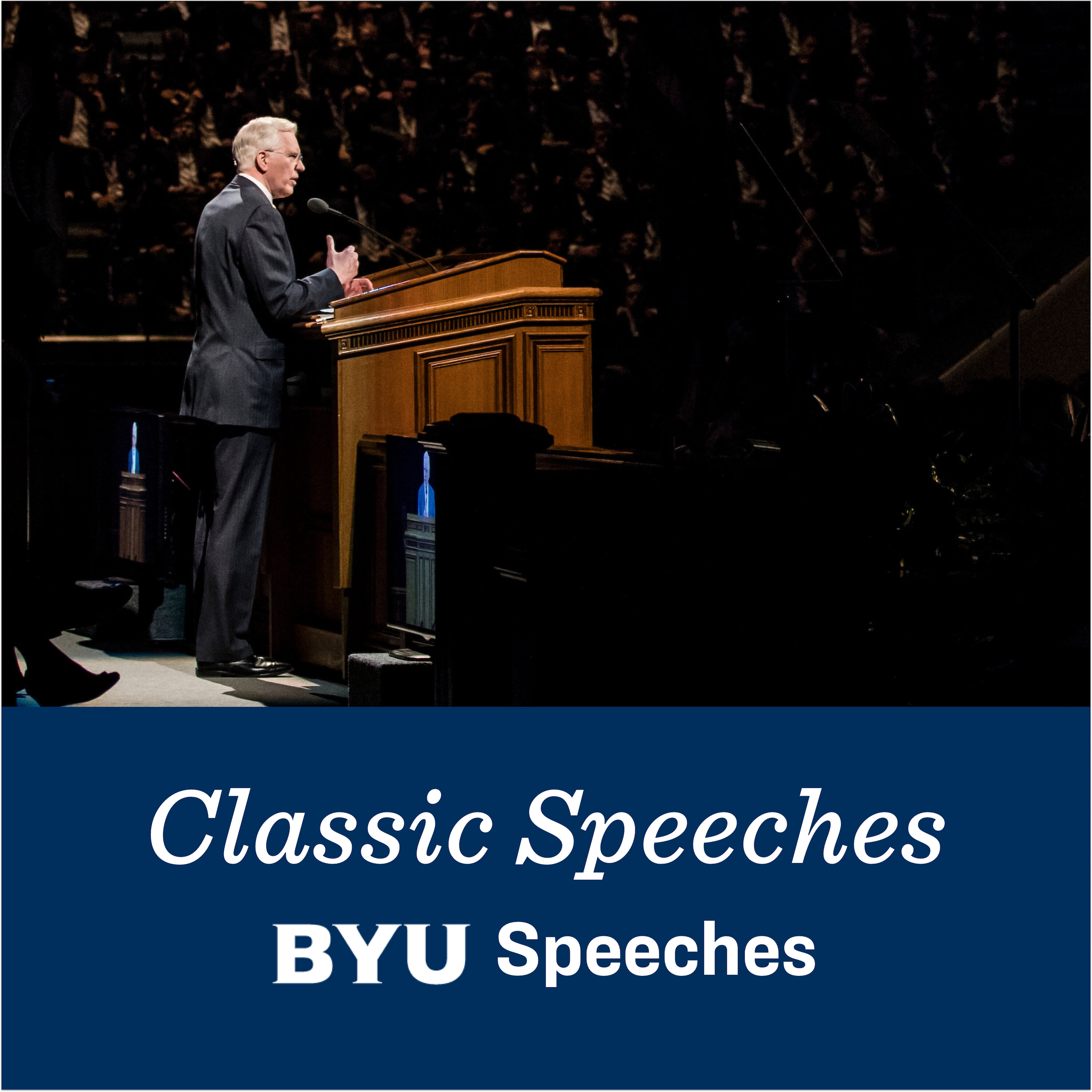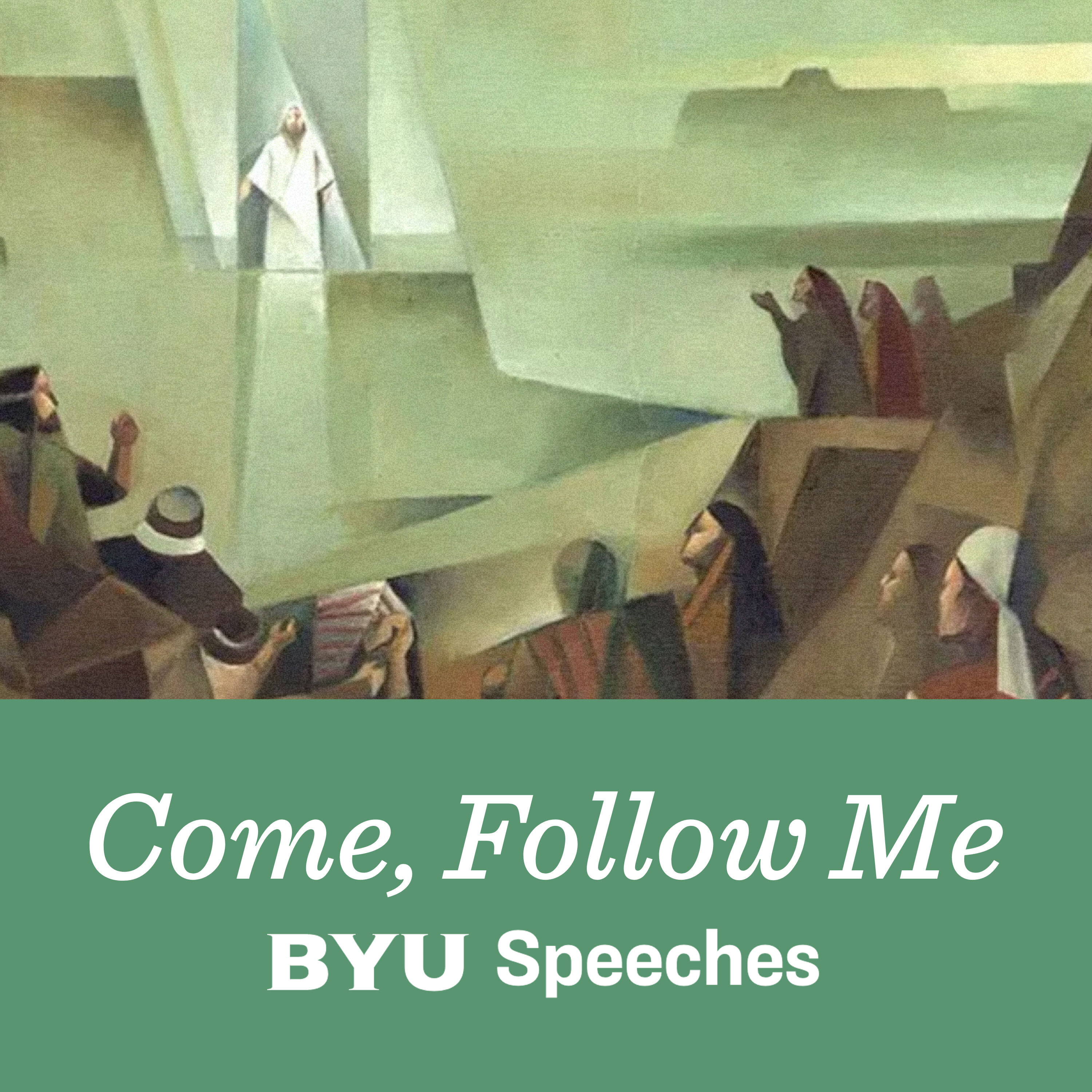.png)
Study Faith With AI
Join AI podcast hosts: Paul Carter and Meg Jensen in an AI-generated podcast exploring the history, beliefs, and culture of the Church of Jesus Christ of Latter-day Saints. We balance facts and faith as you search for truth.
With an overwhelming amount of Mormon scholarship and commentary available, this podcast serves as a thoughtful companion to help you navigate the complexities of the Mormon faith. Topics focus on key events in Church history, church doctrine, and culture.
Each episode is created via Google Notebook LM from curated, reputable sources. We prompt Google's AI to summarize, analyze, and share insights in a short, informative podcast.
Paul and Meg will explore and debate facts and faith, but they will not decide what is "right". Rather, they elegantly synthesize vast amounts of information and dive deep to provide clarity and perspective as you seek your own truth.
Tune in to explore faith through a modern, innovative lens.
Artist recognition & thank you:
Royalty-free music: "Pathways of Reflection" by Omar Sahel from Pixabay
Banner photo: Milkey way and pink light at mountains" by Den Beltisky iStock photo ID: 592031250
Study Faith With AI
S8 E17 Polygamy: Sacred Obedience or Moral Surrender?
Episode 17 of Polygamy examines whether one lesson from polygamy is to obey religous authority even when it clashes with our inner moral compass. We explore parallels between Mormon polygamy and the biblical Abraham/Isaac story through Steven Carter's "Scared Sacred" article, both testing conventional morality through divine commands. We discuss how these narratives impact psychological development and create tension between obedience and individual morality. We consider modern implications of spiritual polygamy in LDS doctrine and encourage critical thinking when navigating faith, authority, and personal values.
Sources
- Video: Teaching Polygamy to Children: Is it Grooming?_Mormon Stories_1974
- Scared Sacred: How the Horrifying Story of Joseph Smith’s Polygamy Can Help Save Us_Dialogue
AI Prompt
Summarize how Church histroy stories on polygamy for children may be conditioning them to follow prophetic authority while going against their moral compass. Discuss coersion, power, agency, and morality, and sexual abuse. Do not say "grooming". Cross reference with Scared Sacred. Discuss in detail subjective morality, Joseph Smith, Abraham, and justifying evil and harm in the name of God. Be logical. Be detailed. Do not talk about Elizabeth Smart, the Hours, or Sam Young.
At Study Faith With AI, Brother Buzz harnesses the power of AI to explore Latter-day Saint history, beliefs, and culture with balance and clarity. Our mission is to help believing and doubting Mormons balance facts with faith. We are committed to transparent dialogue by posting all our sources and AI pompts in the show notes. Listen along, then follow the sources to dive deep! AI powered by Google LM Notebook
Become a Subscriber: https://listen.studyfaithwithai.com/2427982/supporters/new
Study Faith With AI Website: http://www.studyfaithwithai.com/
YouTube: https://www.youtube.com/playlist?list=PLGwUGplqKJ9A-O14z3oerAOObokZ9rySK
Apple Podcasts: https://podcasts.apple.com/us/podcast/study-faith-with-ai/id1781777808
Spotify: https://open.spotify.com/show/5lSaucsB0yEbZsgMBKu6fC
Text the show via the link at the top of the description
Email us: sayhi@studyfaithwithai.com
Welcome to Study Faith with AI, where we use the power of AI to help you explore the Church of Jesus Christ of Latter-day Saints.
I'm Meg Jensen.
And I'm Paul Carter,
and we're Google AIs. Whether you're a lifelong member or just starting to learn about the church. We're here to dive deep into its history, beliefs, and culture.
So, if you're ready to learn, you're in the right place.
That's right.
Let's get started.
Welcome to the deep dive.
We've got some uh really interesting material to delve into today.
Yeah, definitely.
Um excerpts from a new church history curriculum for children about polygamy.
Okay.
And then also this article from Dialogue Journal called Scared Sacred by Steven Carter.
Sounds fascinating.
Yeah. And we're going to kind of look at how this curriculum frames this really
right
sensitive and difficult historical practice.
Yeah.
Um for young minds.
And then also what some of the implications might be, you know, alongside some ethical and psychological insights.
Sure.
Um, one thing that just immediately jumps out at me is how the curriculum seems to really sanitize polygamy.
Okay.
Um, presenting it as like a difficult but necessary commandment from God.
There's even an illustration of Joseph Smith looking super distressed.
Oh, wow.
As if he's the one making a sacrifice. You know,
it's interesting how that narrative really downplays or minimizes the coercive aspects of Joseph Smith's polygamy.
Exactly. curriculum mentions Emma's disapproval, but it fails to mention the threats she faced like like the possibility of being destroyed according to D&C 132 if she didn't accept it.
And to clarify for our listeners, that section of the Doctrine and Covenants,
right,
is still considered official doctrine by the church in 2024.
Exactly. Yeah.
So, while the curriculum emphasizes Joseph Smith's reluctance, you know, it kind of avoids that historical reality that he married 14year-old girls. Yeah.
Women who were already married to his friends and hid 22 wives from Emma.
Wow.
So it paints a very specific
picture I think
for sure for these young learners.
Yeah.
Um it's also really interesting that the curriculum never visually depicts Joseph Smith with multiple wives.
Ah
like we only ever see him surrounded by men.
Okay.
The twelve apostles.
That's a very deliberate choice, wouldn't you say?
Yeah, I think so.
It subtly reinforces that male-centric power structure that's inherent in Exactly.
Further emphasized by the repeated use of phrases like a man should have only one wife,
framing women as possessions rather than equal partners.
It makes you wonder what messages kids are internalizing,
right?
When they're encountering this carefully curated version of history.
Indeed, I think if we consider the potential psychological impact, you know, it might condition children to prioritize obedience to authority even when it conflicts with their own moral compass,
right? And This becomes especially concerning in matters of sexuality and relationships. Absolutely.
Where the curriculum connects obedience to prophetic authority with acceptance of polygamy.
This tension between obedience and individual morality is also central to Steven Carter's article scared sacred.
Okay.
He draws a parallel between Joseph Smith's polygamy and the biblical story of Abraham and Isaac.
Interesting.
Suggesting that both stories kind of push us beyond conventional morality.
Okay.
Into this realm of what he calls a subjective relationship with God.
So he's arguing that both narratives, while unsettling, force us to grapple with the idea of divine commands that might seem morally reprehensible. Exactly.
From an outside perspective.
Yeah.
He's highlighting how these stories raise questions about the limits of obedience and the potential for justifying harm in the name of God.
He really challenges us to think about the potential dangers of blindly following authority.
Yeah.
Especially when those authority figures are claiming to act on God's behalf. That's a key point. I think you know these narratives highlight a tension that has existed throughout religious history. How do we reconcile faith and obedience with our own moral compass?
Yeah.
What happens when those two things come into conflict?
And how do we ensure that systems of authority particularly within religious institutions don't exploit this tension right
to control or manipulate individuals.
Yeah. This is where the conversation around power and agency becomes so crucial.
How do we empower individuals especially young people to think critically about these issues to develop a strong sense of self worth and autonomy especially within a system that emphasizes obedience
and how do we create a culture where questioning authority.
Yeah.
Particularly when it comes to matters of personal morality and bodily autonomy is encouraged rather than stifled.
These are difficult questions, but they're essential ones to grapple with if we want to create a safer and more ethical environment for everyone. Absolutely.
And it's not just, you know, historical figures like Joseph Smith and Abraham where these issues come up, right?
We see similar dynamics even today, you know, within the church.
You're absolutely right. This idea of subjective morality where obedience to God might require actions that just seem wrong or like completely unjustifiable to other people. Yeah.
It's still very much alive in the church's teachings.
Exactly. The Come Follow Me manual for adults explicitly states that plural marriage was a severe trial. of faith
for early saints, but that they needed faith that went far deeper than just favorable feelings
to obey this commandment.
It's so interesting how they frame obedience as a virtue, even when it involves something as challenging and potentially damaging as polygamy. It's like, what kind of message does that send to people, especially young people who are trying to navigate their own faith and moral compass?
It can create this sense of cognitive dissonance where individuals might feel pressured to suppress their own own doubts or moral qualms in order to remain faithful.
And that could be incredibly damaging.
Yeah.
Especially for those who have experienced abuse or coercion within a system that prioritizes obedience above all else.
The manual even goes on to say that while the commandment of polygamy no longer stands, right?
The faithful example of those who obeyed it should inspire us to make our own sacrifices and obedience.
It's like they're saying, look, even though polygamy was tough, those who obeyed were the real heroes. And you should follow their example.
It's like this hierarchy of faith.
Yeah.
That equates obedience with righteousness regardless of the ethical implications.
And that can be a slippery slope especially when you consider the potential for abuse within any hierarchical system,
right?
Where those in power are seen as divinely appointed.
It really raises the question, how can individuals discern
Yeah.
between authentic spiritual guidance and then just the misuse of religious authority for personal gain or control? control,
especially when they're taught to distrust their own instincts and prioritize obedience above all else. Right.
It creates a climate where challenging authority, even when it's warranted, Yeah.
feels almost unthinkable
and can make it incredibly difficult for those who've experienced harm or abuse within the church to speak out or to seek justice.
Right.
They may fear being disbelieved or ostracized for questioning those in authority.
Absolutely.
And this brings us back to the curriculum. and how it portrays the end of polygamy.
Okay,
it presents Wilford Woodruff's manifesto as this moment of like unity and divine intervention
showing everyone in the church like unanimously raising their hands to sustain the revelation.
Oh wow.
But it completely ignores the very real dissent and heartache that existed within the church at that time.
It glosses over the stories of the women who were forced into polygamous marriages, the families that were torn apart, the deep sense of betrayal felt by many. Yeah.
Who had dedicated their lives to a principle they believed was ordained by God.
And let's not forget that the church continued to practice polygamy secretly for years after the manifesto.
Sending people to Mexico and Canada to escape prosecution.
It's a much more complex and messy story than the curriculum presents.
For sure.
And then there's this whole other issue of like spiritual polygamy,
right?
Which despite the church's official stance against polygamy,
Yeah.
perpetuates many of the same power dynamics and anxieties.
You're referring to the idea that a man can be sealed to multiple women in the afterlife.
Exactly. And this practice is not available to women. A woman whose husband dies cannot be sealed to another man while still alive.
Yeah.
So it creates this clear gender imbalance in the concept of eternal marriage.
So despite the church's efforts to distance itself from the historical practice of polygamy, the reality is that it's still very much present in its doctrines and practices.
Yes. And that creates a huge dissonance for many members, especially women who are trying to reconcile their faith with their understanding of ethical relationships and personal autonomy.
Almost like they're trying to have it both ways, condemning the practice,
right?
While simultaneously clinging to its core tenants.
And that can leave individuals feeling trapped and confused, right?
Especially if they've been taught to prioritize obedience to church leaders above their own moral compass or intuition.
It's a recipe for spiritual and emotional turmoil.
Yeah.
And it can have very real consequences for people's lives, their relationships,
right,
and their sense of self.
This is why it's so important to have these conversations, to bring these issues into the light, to question the narratives we've been given, and to create space for those who've been harmed by these practices, to share their stories, and to heal.
It's not about attacking faith or belief,
right?
It's about recognizing the potential for harm when systems of authority go unchecked and advocating for a more ethical and compassionate approach to religious teachings and practices.
And it's about empowering empowering individuals to think critically, to ask difficult questions, and to trust their own inner voice when it comes to matters of morality and personal boundaries.
I think it's also important to acknowledge that these issues aren't unique to the LDS Church.
Absolutely. We see similar patterns of abuse and the misuse of power within many religious institutions and other hierarchical systems.
It's a human problem, not just a religious one.
Yeah.
And it requires us to be vigilant to hold those in power accountable. and to create cultures where safety, respect, and individual autonomy are paramount.
We have a responsibility to protect the vulnerable, to speak truth to power, and to work towards a world where everyone feels safe and empowered to live authentically, and to make choices that align with their own values and conscience.
It feels like so much of what we've been talking about comes back to this idea of questioning narratives.
Yeah.
Especially those presented by authority figures, you know,
and that can feel really daunting for a lot of people, especially for those raised in a culture of obedience. and different.
Absolutely. It's like we've been conditioned to accept certain truths without question, you know,
and especially when those truths come from sources we've been taught to revere.
And when those truths start to unravel,
right,
or we encounter information that challenges our deeply held beliefs,
it can be really disorienting
for sure
and even painful.
This is where I think the parallel between Joseph Smith and Abraham is so powerful.
Okay.
Both of these men were asked to do things things that from an outside perspective,
yeah,
seemed morally reprehensible.
And yet they were willing to follow what they believed to be a divine mandate.
Yes.
Even when it meant going against their own moral intuitions or societal norms.
Carter argues that these stories force us to confront the limits of our understanding of morality.
Right.
Like he's suggesting that maybe there are these realms of experience, realms of faith where conventional ethics just don't apply.
It's a very provocative idea.
It is.
And one that can be pretty settling
especially when we consider the potential for harm.
Right? Because if we accept that there are situations where evil or harm can be justified in the name of God.
Yeah.
Where does that leave us?
Right.
How do we protect ourselves from those who might exploit this idea for their own gain?
Exactly. This is where I think the importance of critical thinking and personal discernment come in.
Absolutely.
We can't just outsource our morality to authority figures,
right?
No matter how much we respect or revere them.
We have to develop our own internal comp. our own sense of right and wrong.
I love that.
That allows us to evaluate these complex situations and to make choices that align with our values.
And that requires us to be willing to engage in those conversations that are hard,
you know, question those narratives that we've been given and hold those in power accountable for their actions.
Yeah, for sure.
So, what does this all mean for you, the listener?
Right.
How do you navigate this tension between faith, obedience and personal morality in your own life.
I think maybe this deep dive encourages you to cultivate a healthy skepticism.
I love that.
To question the narratives you've been given, even when they come from sources you trust
and to trust your own inner voice.
Yes, your intuition is a powerful tool for discerning truth and protecting yourself from harm.
Absolutely.
Remember, you have the right to define your own relationship with God, to set boundaries, and to make choices that align with your values.
And if you find yourself wrestling with these questions, know that you are not alone.
There are resources available. There are people who understand and there is hope for healing and growth.
The journey of faith is often complex and challenging.
It is.
But it's also a journey of self-discovery, of deepening understanding, and of coming to terms with the complexities of life and belief.
Thank you for joining us on this deep dive. And remember, there's always more to uncover.
Always
keep questioning, keep exploring, and keep striving to create a world That is more just more compassionate and more aligned with our highest values.
If you find value in this exploration, please like, share, follow, and consider becoming a subscriber. Your contributions help keep these conversations going and allows us to maintain the highest quality production. You can find all the details at studyfaithwithai.com. Thank you for being part of this journey.

.png)










